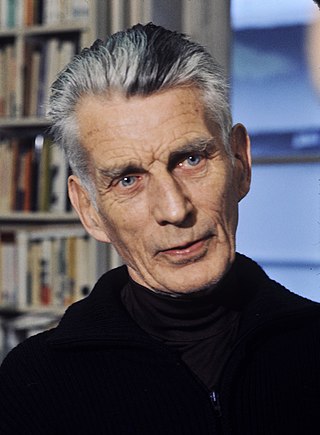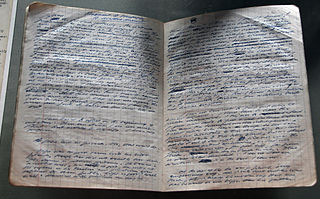
Samuel Barclay Beckett was an Irish novelist, dramatist, short story writer, theatre director, poet, and literary translator. His literary and theatrical work features bleak, impersonal and tragicomic experiences of life, often coupled with black comedy and nonsense. His work became increasingly minimalist as his career progressed, involving more aesthetic and linguistic experimentation, with techniques of repetition and self-reference. He is considered one of the last modernist writers, and one of the key figures in what Martin Esslin called the Theatre of the Absurd.

Waiting for Godot is a play by Samuel Beckett in which two characters, Vladimir (Didi) and Estragon (Gogo), engage in a variety of discussions and encounters while awaiting the titular Godot, who never arrives. Waiting for Godot is Beckett's translation of his own original French-language play, En attendant Godot, and is subtitled "a tragicomedy in two acts".

The Theatre of the Absurd is a post–World War II designation for particular plays of absurdist fiction written by a number of primarily European playwrights in the late 1950s. It is also a term for the style of theatre the plays represent. The plays focus largely on ideas of existentialism and express what happens when human existence lacks meaning or purpose and communication breaks down. The structure of the plays is typically a round shape, with the finishing point the same as the starting point. Logical construction and argument give way to irrational and illogical speech and to the ultimate conclusion—silence.
Breath is a notably short stage work by Samuel Beckett. An altered version was first included in Kenneth Tynan's revue Oh! Calcutta!, at the Eden Theatre in New York City on 16 June 1969. The UK premiere was at the Close Theatre Club in Glasgow in October 1969; this was the first performance of the text as written. The second performance, and the English premiere, was at a benefit held at the Oxford Playhouse on March 8, 1970. “The first accurate publication appeared in Gambit 4.16 (1969): 5–9, with a manuscript facsimile.”
Act Without Words I is a short play by Samuel Beckett. It is a mime, Beckett's first. Like many of Beckett's works, the play was originally written in French, being translated into English by Beckett himself. It was written in 1956 following a request from the dancer Deryk Mendel and first performed on 3 April 1957 at the Royal Court Theatre in London. On that occasion it followed a performance of Endgame. The original music to accompany the performance was written by composer John S. Beckett, Samuel's cousin, who would later collaborate with him on the radio play Words and Music.
Play is a one-act play by Samuel Beckett. It was written between 1962 and 1963 and first produced in German as Spiel on 14 June 1963 at the Ulmer Theatre in Ulm-Donau, Germany, directed by Deryk Mendel, with Nancy Illig (W1), Sigfrid Pfeiffer (W2) and Gerhard Winter (M). The first performance in English was on 7 April 1964 at the Old Vic in London. It was not well-received upon its British premiere.
Ohio Impromptu is a "playlet" by Samuel Beckett.

Krapp's Last Tape is a 1958 one-act play, in English, by Samuel Beckett. With a cast of one man, it was written for Northern Irish actor Patrick Magee and first titled "Magee monologue". It was inspired by Beckett's experience of listening to Magee reading extracts from Molloy and From an Abandoned Work on the BBC Third Programme in December 1957.
Endgame, by Samuel Beckett, is an absurdist, tragicomic one-act play about a blind, paralyzed, domineering elderly man, his geriatric parents and his doddering, dithering, harried, servile companion in an abandoned house in a post-apocalyptic wasteland, who mention they are awaiting some unspecified "end" which seems to be the end of their relationship, death, and the end of the actual play itself. Much of the play's content consists of terse, back and forth dialogue between the characters reminiscent of bantering, along with trivial stage actions; the plot is held together by the development of a grotesque story-within-a-story that the character Hamm is relating. An aesthetically profound part of the play is the way the story-within-story and the actual play come to an end at roughly the same time. The play's title refers to chess and frames the characters as acting out a losing battle with each other or their fate.
What Where is Samuel Beckett's last play produced following a request for a new work for the 1983 Autumn Festival in Graz, Austria. It was written between February and March 1983 initially in French as Quoi où and translated by Beckett himself.
Not I is a short dramatic monologue written in 1972 by Samuel Beckett which was premiered at the "Samuel Beckett Festival" by the Repertory Theater of Lincoln Center, New York.
Quad is a television play by Samuel Beckett, written and first produced and broadcast in 1981. It first appeared in print in 1984 where the work is described as "[a] piece for four players, light and percussion" and has also been called a "ballet for four people."
For the song "That Time" by Regina Spektor see Begin to Hope

Watt was Samuel Beckett's second published novel in English. It was largely written on the run in the South of France during the Second World War and was first published by Maurice Girodias's Olympia Press in 1953.

Mercier and Camier is a novel by Samuel Beckett that was written in 1946, but remained unpublished until 1970. Appearing immediately before his celebrated "trilogy" of Molloy, Malone Dies and The Unnamable, Mercier et Camier was Beckett's first attempt at extended prose fiction in French. Beckett refused to publish it in its original French until 1970, and while an English translation by Beckett himself was published in 1974, the author had made substantial alterations to and deletions from the original text while "reshaping" it from French to English.

Embers is a radio play by Samuel Beckett. It was written in English in 1957. First broadcast on the BBC Third Programme on 24 June 1959, the play won the RAI prize at the Prix Italia awards later that year. Donald McWhinnie directed Jack MacGowran – for whom the play was specially written – as "Henry", Kathleen Michael as "Ada" and Patrick Magee as "Riding Master" and "Music Master". The play was translated into French by Beckett himself and Robert Pinget as Cendres and was published in 1959 by Les Éditions de Minuit. The first stage production was by the French Graduate Circle of Edinburgh, Edinburgh Festival, 1977."
Ghost Trio is a television play, written in English by Samuel Beckett. It was written in 1975, taped in October 1976 and the first broadcast was on BBC2 on 17 April 1977 as part of The Lively Arts programme Beckett himself entitled Shades. Donald McWhinnie directed with Ronald Pickup and Billie Whitelaw. The play's original title was to be Tryst. "On Beckett’s notebook, the word was crossed out vigorously and the new title Ghost Trio written next to it. On the title page of the BBC script the same handwritten title change can be found, indicating that it must have been corrected at the very last minute."
Imagination Dead Imagine is a short prose text by Samuel Beckett first published in French in Les Lettres nouvelles in 1965. Its first English publication was a translation in The Sunday Times in 1965 followed by a trade edition by Beckett's London-based publisher, Calder and Boyars, later that year.
All Strange Away is a short prose text by Samuel Beckett first published in English in 1964. A special signed edition with illustrations by Edward Gorey was published in 1976, and in a trade edition by Grove Press of collected texts titled, Rockaby and Other Short Pieces in 1981. Beckett's British publisher, John Calder, also printed the work independently in 1979 and again, in 1990, in a collection of late prose works under the title, As the Story was Told.
David Warrilow was an English actor best known as one of the "finest interpreters of Samuel Beckett’s work".






